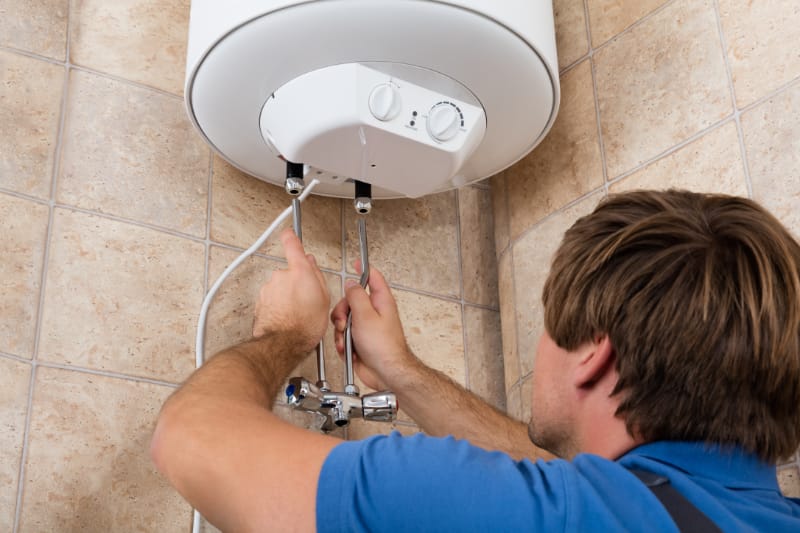When it comes to your home’s water heating system, deciding between installing a new unit or replacing an old one can be challenging. Each option has its benefits, and the right choice depends on factors like the age of your current water heater, your hot water needs, and your budget. In this guide, we’ll walk you through the considerations for both water heater installation and replacement, helping you make an informed decision.
Understanding Water Heater Installation and Replacement
To start, let’s define what each option entails:
- Water Heater Installation: This is the process of adding a new water heater to a home or property where one did not previously exist. This could apply to newly constructed homes, home additions, or switching from an alternative hot water source to a water heater.
- Water Heater Replacement: Replacement occurs when an existing water heater has reached the end of its lifespan or is no longer meeting the household’s needs. A replacement involves removing the old unit and installing a new, often upgraded, model.
Professionals like Benjamin Franklin Plumbing can help homeowners determine the best course of action based on their specific needs and system performance.
Key Factors to Consider
Several factors can influence your decision to either install a new water heater or replace an existing one. Let’s explore these elements to help you assess which option is right for you.
1. Age and Condition of the Current Water Heater
The age of your current water heater is one of the most significant factors in deciding whether to replace it. Most water heaters have a lifespan of 8-12 years for traditional tank models and up to 20 years for tankless units. If your water heater is approaching or has surpassed these timelines, replacement may be a more cost-effective solution than installing a brand new system.
Additionally, if your water heater has required frequent repairs recently, it may be time to consider replacement rather than spending more on ongoing fixes.
2. Energy Efficiency and Utility Costs
One of the primary benefits of installing a new water heater or replacing an outdated one is the opportunity to improve energy efficiency. Older water heaters can become inefficient over time, consuming more energy to heat water and resulting in higher utility bills. Newer models, especially those with ENERGY STAR certifications, are designed with enhanced insulation, energy-saving features, and lower energy consumption.
If you’re noticing a steady increase in your utility bills and suspect your water heater may be the cause, upgrading to a newer model during replacement can offer long-term savings.
3. Hot Water Demand and Household Size
The size and hot water needs of your household are critical factors when deciding between water heater installation and replacement. If you’re expanding your home or have a growing family, your current water heater may not be able to keep up with increased demand. This could mean it’s time to install a larger or more efficient water heater to meet the new hot water requirements.
On the other hand, if you’re replacing an older model, this is an excellent time to assess your household’s needs and upgrade to a more suitable capacity. For instance, tankless water heaters are ideal for households seeking on-demand hot water without the need for a large storage tank.
4. Budget and Installation Costs
Both water heater installation and replacement come with associated costs, but they can vary depending on the type of unit and installation requirements. Installing a new water heater from scratch may involve additional costs if it requires plumbing and electrical work to accommodate the new system. Replacement, however, typically involves fewer additional expenses, as the necessary connections and infrastructure are already in place.
It’s essential to get an accurate estimate of costs for both options, allowing you to choose the solution that aligns best with your budget by check out Sameday BC Fix Water Heater who can do water heater install and ensures your water heater is restored to optimal performance, extending its lifespan and maintaining your home’s comfort.
Comparing Types of Water Heaters
Whether you’re installing a new water heater or replacing an old one, understanding the types available can help you choose the right model for your needs.
- Traditional Tank Water Heaters: These store a large amount of water and maintain it at a consistent temperature, making them suitable for homes with higher water demand. They are generally more affordable upfront but may be less energy-efficient over time.
- Tankless Water Heaters: Tankless units heat water on demand, providing a continuous supply without the need for storage. These models are typically more energy-efficient and have a longer lifespan, though they require a higher initial investment.
- Heat Pump Water Heaters: These systems use electricity to move heat from the air or ground to heat the water. They are energy-efficient and environmentally friendly but may require more space and have a higher initial cost.
- Solar Water Heaters: Solar water heaters use energy from the sun to heat water, making them a highly sustainable option. However, they require a solar panel installation, which can be costly.
A professional plumber, like those at Benjamin Franklin Plumbing, can provide guidance on the best type of water heater based on your specific needs and local climate conditions.
Benefits of Replacing Your Water Heater
Replacing an existing water heater has several advantages that make it a practical choice for many homeowners:
- Improved Performance: Newer water heaters are designed with advanced technology that improves heating speed and reliability, providing hot water when you need it.
- Better Energy Efficiency: Modern units have better insulation and energy-saving settings, helping you save on energy costs in the long run.
- Reduced Risk of Leaks and Repairs: Older water heaters are more prone to leaks and mechanical issues. Replacing an aging unit with a new one can prevent future repair costs and reduce the risk of water damage.
When New Installation Makes Sense
In certain situations, installing a completely new water heater might be the better option. Some scenarios include:
- New Home Additions or Renovations: If you’re adding new bathrooms or an additional living space to your home, installing a new water heater may be necessary to meet the increased demand.
- Switching to a Different Water Heating Method: If you currently use an alternative water heating method and want to switch to a traditional or tankless water heater, a new installation may be required.
- Upgrading to a More Sustainable Option: For eco-conscious homeowners, installing a solar or heat pump water heater can significantly reduce your carbon footprint and lower utility costs.
Choosing the Right Professional for the Job
Whether you’re installing a new water heater or replacing an old one, it’s essential to hire a licensed professional for the job. Working with experts, like the team at Benjamin Franklin Plumbing, ensures that your installation or replacement is handled safely, efficiently, and in compliance with local codes.
Licensed plumbers can also provide recommendations for the best water heater models to suit your needs, offering valuable insight into energy efficiency, performance, and capacity.
Final Thoughts: Installation or Replacement?
Choosing between water heater installation and replacement depends on your current water heater’s age, efficiency, and ability to meet your household’s needs. If your existing unit is old, inefficient, or frequently needs repairs, replacement is likely the best option. However, if you’re adding space to your home or switching to a more sustainable heating solution, new installation might be the way to go.
By consulting with a trusted professional, such as Benjamin Franklin Plumbing, you can make an informed decision and enjoy the benefits of a reliable water heater that meets your home’s unique requirements.




